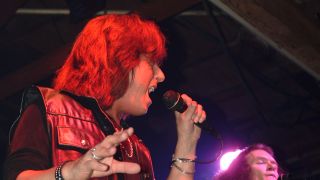Joe Lynn Turner helped define the melodic rock genre when he joined Rainbow in 1980. Songs such as I Surrender, Can’t Happen Here and Street Of Dreams out-Foreignered Foreigner, and helped propel Ritchie Blackmore’s band high into the charts on both sides of the Atlantic. Many people panned Rainbow for ditching their epic heavy rock for a softer direction, but as Turner says today: “For every lost fan, we gained two new ones.” In February 2005, the New Jersey-born singer released his ninth solo album, The Usual Suspects.
You’ve been involved in a huge number of projects since you came to prominence in the group Fandango in the mid-70s: Rainbow, Deep Purple, Yngwie Malmsteen’s Rising Force, you worked with Glenn Hughes in the Hughes-Turner Project, you remain a member of Brazen Abbot… and that’s just for starters.
Yeah [laughs], I like to keep busy, don’t I? I just can’t seem to sit still.
Why should anyone listen to _The _Usual Suspects?
When I look back at some of my recent records, I’m not singing to the best of my abilities. We always spent a lot of time on the music but the vocals used to be done in about five minutes. For the new album, I did all the vocal parts in the studio downstairs at my house. There was no clock running, and that really made a difference. I was able to rope in some of my best mates to play on it, like guitarists Al Pitrelli [Megadeth, Savatage] and Karl Cochran [Ace Frehley], plus drummer John O’Reilly and keyboard player Paul Morris, who were in one of the last incarnations of Rainbow, when Doogie White was singing with them. So that explains the title of the album: The Usual Suspects.
It is reminiscent of your time in Rainbow.
It has big choruses, but it also rocks hard in lots of places. iPod it and take what you want. I can’t separate myself from what I was doing 20, 25 years ago; it’d be like cutting off an arm. I’m extremely fond of those days.
You’re in your early 50s now, but you still have that highly polished, typically AOR voice.
My wife is a big Paul Rodgers fan, and she always wants me to sing sexy and low. But I insist on staying in my vocal range. Mind you, it is a four-and-a-half-octave range.
**Lots of people still haven’t forgiven you for turning Rainbow into a slick chart outfit. **
Ritchie had this vision of Rainbow becoming a commercial rock band. He was living in the States at the time, and I remember him saying: “I want to hear my songs on American radio.” We knew exactly what we were doing. Plus we started getting girls in the audience. You never used to get lumps at a Rainbow show before. But back then we thought we were immortals. We were young and dumb and full of cum. Eventually I got tired of waking up in Utah underneath a piano with some strange woman.
What about when you became a member of Deep Purple?
I’m very proud of the album I did with them, [1990’s] Slaves & Masters. But then all the back-biting kicked in, and they brought Ian Gillan back - even though Ritchie hated him. The next Purple album was called The Battle Rages On, but Ritchie used to call it The Cattle Grazes On. Don Airey [then-current Purple keyboardist] suggested we set up a retirement home for ex-Purple members. He told me: “We’d only need a modest place… with about 300 rooms.”
What else have you got planned?
I’m working on a rock opera with the people who did Queen’s We Will Rock You theatre show. It’s about Galileo and it’s called Stargazer. Nothing to do with Ronnie Dio’s old Rainbow song, of course. Plus I might be involved in a stage version of Brazen Abbot’s Nostradamus project. And we’re talking about re-forming Mother’s Army. I told you I like to keep busy.
_Joe Lynn Turner’s album _The Usual Suspects is available via Frontiers.


